The Women Behind the Wheel: Meet Croatia Football Team's Party Bus Drivers
December 20, 2022 - On Sunday, Ana Golomeić and Nikolina Žiljak drove the party buses for the Croatia Football Team. Just like they did four years ago when the silver Vatreni returned from Russia.
24Sata quotes the driver: "the Vatreni recognised me, and that was great. When they saw me, they said: 'Here she is, that lady who drove us the last time,'" - laughs Nikolina Žiljak, who drove the Vatreni on Sunday in a panoramic bus from the beginning of the Sava road to the Ban Josip Jelačić square. Ana Golomeić drove the staff members in the other bus.
Four years ago, when the Vatreni returned from Russia with silver, the ladies behind the wheel were ZET's drivers Ana and Nikolina, who were honoured to do so again, as they say, after a job well done four years ago.
"The bosses were satisfied because we behaved professionally and drove the whole way without any problems. I believe that's why they chose us again. We were happy to hear that we will do it again," the ladies said. However, this time, they admitted, everything was completely different from the last time.
"It was much more difficult because it was dark, the torches were blazing, and you had to be very careful about the people on the road and everything that could go wrong. Four years ago, everything was much clearer because it was daylight so I could drive a little more relaxed. Besides, it was freezing this time, and I was confined in my cabin and didn't interact with the passengers. In the end, the only important thing is that everything went as it should", said Ana. She added that although it was much shorter than four years ago, the journey from Savska to the Square took an eternity for her.
"There is no need for the gas pedal; you hold the brake. Walking would be much faster than the way I drove. But those are the rules. The journey took about 40 minutes, but it seemed much longer to me", said Ana.
Nikolina, who drove the football players, was isolated in her cabin. Four years ago, she became headline news because she refused Luka Modrić's request to sit behind the bus wheel for a while. She says there was neither occasion nor time for such teasing this time.
"I am happy that they recognised me, and that is enough. When they got off the bus, they thanked me nicely. It's a memory for a lifetime and that's why I'm grateful that I had this opportunity to drive the Vatreni", said Nikolina.
She added that her children and all the people she loves are proud of her.
"They are also honoured to say they know the woman who drove the Vatreni,” laughs Nikolina. Four years ago, she says, she was convinced that it was the only time she would do something like that in her life. It all happened again, though.
"Rarely does anyone get this kind of opportunity, and that's why I'm grateful. If necessary, I would do it all again", she said.
For more, make sure to check out our dedicated Lifestyle section.
How Much Cash Will HNS Get from FIFA? How Much Will Players Earn?
December the 19th, 2022 - Following an absolutely incredible performance at 2022's World Cup over in Qatar, the Croatian national team arrived home this evening to a packed Ban Jelacic Square and a welcome home celebration reminiscent of scenes from 2018 - which they thoroughly deserved. With football fever now over for another four years, just how much will HNS get from FIFA, and how much will Croatia's players earn from the government?
As Poslovni Dnevnik writes, the Croatian national team (or the Vatreni, if you prefer) played an absolutely fantastic game of which we can all be very proud, they defeated Morocco 2:1 and pocketed the bronze medal. Thanks to them having showcased Croatia's enormous sporting spirit, they will all also receive handsome amounts of money, but how much does it all amount to, precisely?
HNS will receive a cheque for 30 million dollars (Morocco will receive one worth 25 million dollars) from FIFA for coming third place, and this sum will later be divided between the federation itself and the Croatian national team in a ratio of 60-40 or 55-45 percent. It will be carried out in whichever manner the two parties agree.
Of the amount that will go to those who deserved it the most, 80 percent will be paid directly into the Croatian national team players' personal bank accounts, and 20 percent to the members of the team's dedicated coaching staff.
That's not all, because all members of the Croatian national team will all also receive 120,000 kuna each from the government, as this is according to the regulation for awards to athletes in Olympic sports for medals won at world championships held every four years, i.e the World Cup, as published by tportal.
For more, make sure to check out our dedicated news section.
Where to Watch Croatia’s Upcoming World Cup Games in London
May 7, 2022 - With the 2022 FIFA World Cup coming up in Qatar during the months of November and December, anticipation and excitement is high for Croatia football fans.
To recap, the World Cup starts on 21 November with the final to be played on 18 December. Croatia will play against the following teams:
- Morocco - Wednesday, 23 November
- Canada - Sunday, 27 November
- Belgium - Thursday, 1 December
Many fans are now starting to plan their locations and venues to view the games at, particularly if they choose to view the games in Qatar. Croatia has football fans located all around the world, from the United States and Canada to the United Kingdom - particularly due to the growing Croatian communities in those countries. For those based in London, UK, here's a short list of different pubs and bars that are showing the World Cup this year, and that are in general a great place to hang out, eat and drink, and celebrate Croatia making it to the World Cup for the 6th time.
Bar Kick
The “Home Of Live Sport in Shoreditch”, this basement venue regularly shows every World Cup match in honour of their international clientele, meaning the Croatia games should attract a number of fellow supporters and Croatian viewers alike. Watch the games on their 60- and 80-inch TVs, enjoy their sports menu and daily Happy Hour, and get into the football spirit by playing your own competitive games on their Bonzini table football.
Sports Bar and Grill
As the name suggests, this chain venue is dedicated to showing live sport from every major world football league to rugby, in addition to preparing top quality food such as their legendary burgers and grills. Showing every World Cup match live at the bar, make sure to book a table in advance in order to view Croatia’s game on one of their massive HD screens, with a few friends and a refreshing pint in hand - there is even the option to order your own 5l keg of BrewDog beer for £42.50.
There are six Sports Bars in London, including Victoria, Farringdon, Marylebone, Old Street, Clapham Junction, and Canary Wharf. So no matter where you're located, there should be at least one venue close by or easy to reach.
The Albion
As their website proudly states, live sport is in their DNA. So it’s safe to say that this pub, bar and restaurant is a good pick for watching the World Cup. Located right in the City (a few minutes away from the Blackfriars station), their 5 big screens showing Sky Sports and BT Sports over two floors cover live footage of every international sports tournament from the World Cup to Formula 1 to Tour de France. Book your table in advance to ensure you get the best view when you come to watch Croatia play.
Football Legends of Croatia and Slovenia Play for Petrinja
March 13, 2021 - Football legends of Croatia and Slovenia played a charity match in Petrinja on Saturday, initiated by the president of the Croatian Football Federation and a member of the UEFA Executive Board, Davor Suker, and UEFA president Aleksander Ceferin, to help the areas affected by the devastating earthquake late last year.
HNS reports that on behalf of the umbrella European Football Federation, Aleksander Čeferin presented a donation to the Croatian Red Cross for 50 thousand euros. HNS President Davor Šuker handed over the donation to the Sisak-Moslavina County Football Federation, intended to reconstruct football infrastructure in earthquake-affected areas, for 200 thousand kuna, while the Football Federation of Slovenia donated 5 thousand euros to the Football Club Mladost.
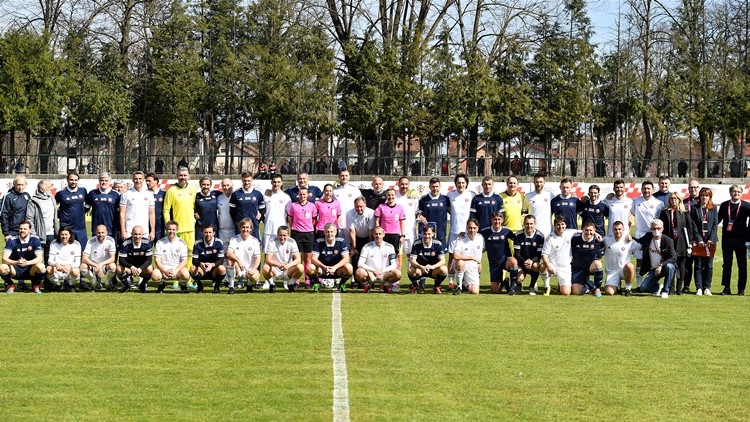
Drago Sopta/HNS
"When I found out about the tragic earthquake in Petrinja and its surroundings, I talked to Davor Šuker, and we started thinking about how we could help. Football is solidarity, football is friendship, and we agreed to organize this match and for UEFA to donate. We were joined by the Croatian Football Federation and the Slovenian Football Federation led by Radenko Mijatović. I am glad that this humanitarian event was a success," said UEFA President Aleksander Čeferin.
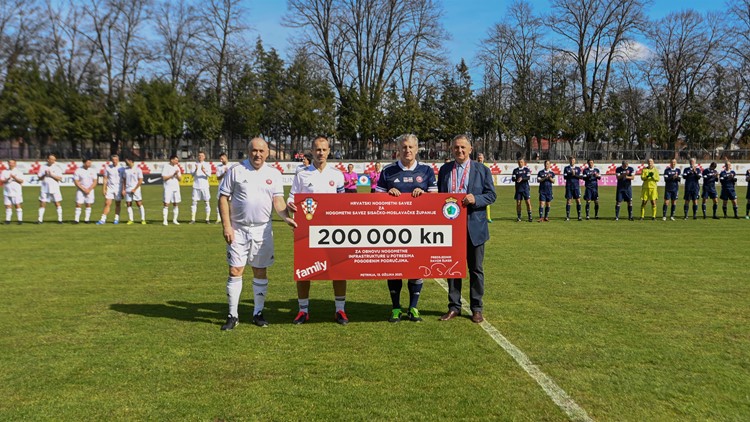
Drago Sopta/HNS
"At the moment when the tragedy happened, the president of UEFA, Alexander Čeferin, and I got in touch, and in the first second we agreed on the match in Petrinja, we were only looking for the most suitable date. I want to thank President Čeferin and the UEFA Executive Board, who voted for this donation. As the Croatian Football Federation president, I am glad that we were able to help the Sisak-Moslavina County Federation. The ball will always roll, the most important thing is that people in this area get a roof over their heads as soon as possible, and everyone who can help is welcome. The least important thing is who won on the field, all of us who were in the service of humanity won," said the president of the Croatian Football Federation, Davor Šuker.
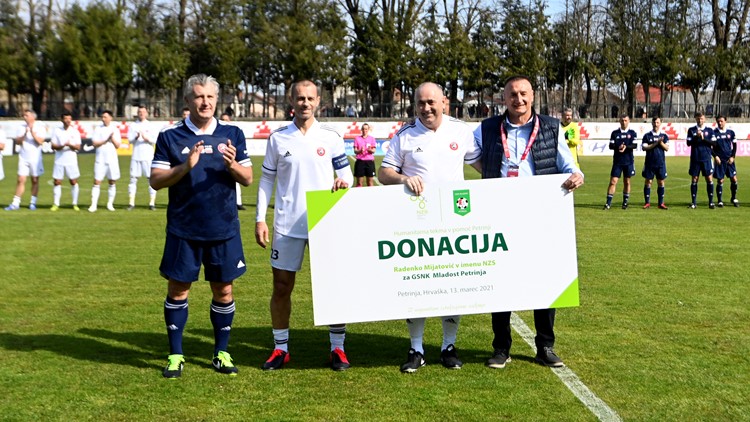
Drago Sopota/HNS
"It is nice that we are all together in Petrinja, and that time has served us. We gladly accepted the joint idea of Aleksandar Čeferin and Davor Šuker, the Football Federation of Slovenia responded to this initiative, I believe that we will make life at least a little easier for people in this area and the local football club in this difficult period," said the president of the Football Federation of Slovenia, Radenko Mijatović.
"I thank all the participants, the players of both national teams, the president of UEFA, Aleksandar Čeferin, and the president of HNS, Davor Šuker, this was a top football spectacle, but, unfortunately, in the earthquake-stricken area. However, this is the day when the history of Petrinja will begin to be written again. The atmosphere was fantastic; I'm sorry that the spectators could not watch this match live, but, in any case, thank you all for helping the City of Petrinja and Sisak-Moslavina County," said the President of the Sisak-Moslavina County Football Federation and a member of the Executive of the HNS Committee, Davor Ivić.
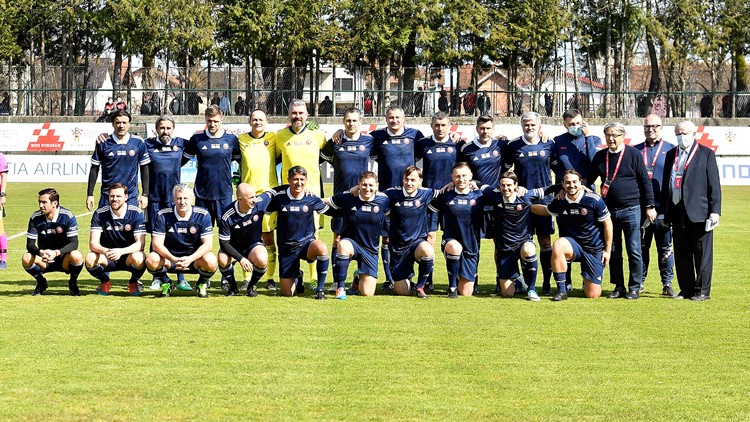
Drago Sopta/HNS
"Sport, and especially football, has a special power to unite us. All athletes have been with us since day one, helping the affected population in various ways. We thank UEFA, HNS, and SNS for deciding to organize such a magnificent sports event and increase it by donating financial aid that will be sent through the Croatian Red Cross to the earthquake-stricken population. We are proud that the Croatian Red Cross is part of this sports humanitarian action," said the executive president of the Croatian Red Cross, Robert Markt.
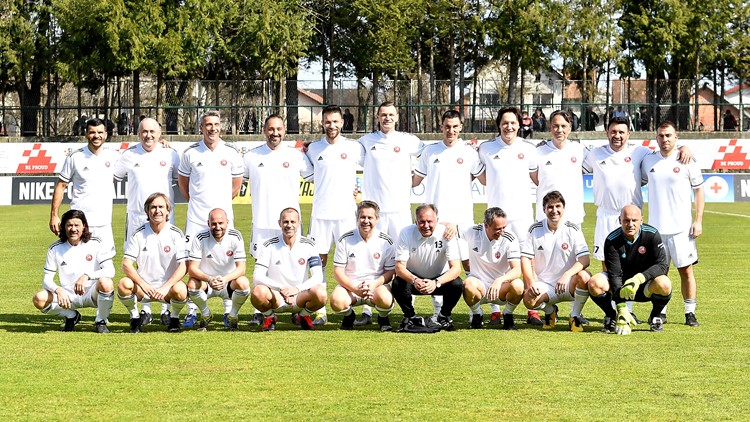
Drago Sopta/HNS
The meeting of Croatia and Slovenia football legends is a continuation of fostering good neighborly relations between the two national federations, which also organized a friendly match in Brdo near Kranj in September last year when the hosts celebrated (3:2). Slovenia celebrated a "close" victory on this occasion, even though Croatia took the lead with a penalty kick by Davor Šukerr. Still, Slovenia reversed the result thanks to the goals of Milivoj Novaković and Milenko Aćimović. The role of the Croatia coach was taken over by the senior advisor to the HNS president, Zorislav Srebrić, and the Croatia team was led by the current coach of the Vatreni, Zlatko Dalić, former coach Miroslav Blažević, and Dinamo legend Marijan Vlak.
CROATIA LEGENDS: Marijan Mrmić, Stipe Pletikosa, Davor Šuker, Zvonimir Boban, Aljoša Asanović, Ivica Olić, Petar Krpan, Dario Šimić, Darijo Srna, Daniel Šarić, Niko Kranjčar, Igor Bišćan, Boris Živković, Silvio Marić, Mihael Mikić, Nenad Pralija, Tomislav Dujmović, Robert Špehar, Marko Babić, Željko Pavlović.
SLOVENIA LEGENDS: Robert Volk, Aleksander Čeferin, Primož Gliha, Miran Pavlin, Milivoje Novaković, Milenko Aćimović, Boštjan Cesar, Mišo Brečko, Radenko Mijatović, Aleksandar Radosavljević, Goran Barišić, Tomaž Vesel, Silvo Vrhovec, Andrej Vrhovec, Robert Beguš, Tomislav Čizmić, Mladen Džanan, Branko Ilić, Mitja Sojer, Jože Prelogar, Robert Beguš.
To read more about sport in Croatia, follow TCN's dedicated page.
Portugal Defeats Croatia in Nations League Opener
September 5, 2020 - In an opening match of this year's football Nations League, Portugal defeated Croatian national team in Porto, with the result 4:1.
The current European champions played against the World Cup finalists in Porto, so the expectations were high. The teams started in the following formations:
PORTUGAL: Lopes - Joao Cancelo, Pepe, Ruben Dias, Guerreiro - Danilo - Joao Moutinho, Fernandes - Jota, Joao Felix, Bernardo Silva
CROATIA: Livaković - Barišić, Vida, Lovren, Jedvaj - Vlašić, Kovačić, Pašalić - Rebić, Kramarić, Brekalo. 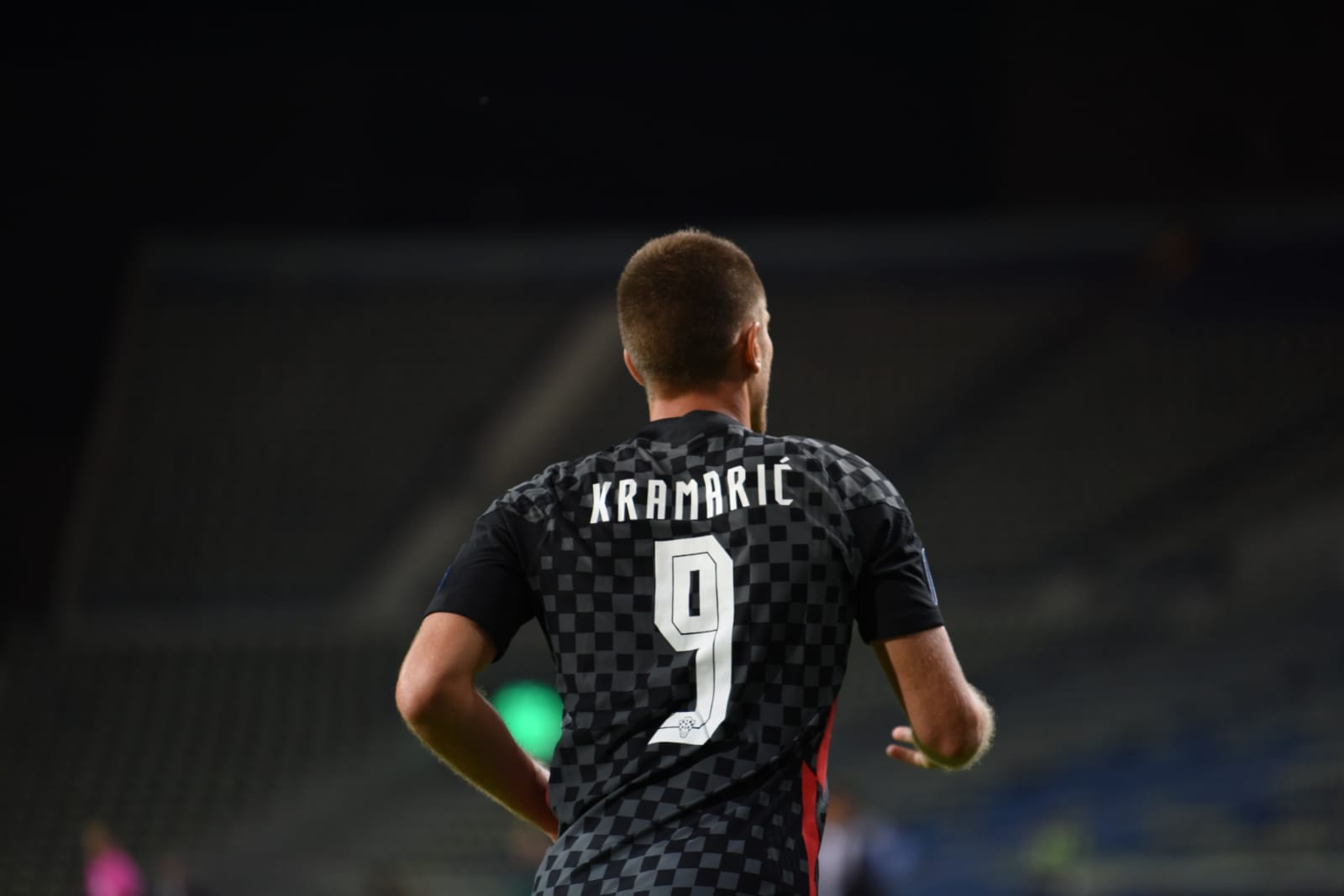
Slobodan Kadic
While the game started with some great attacks by the Croatian team, it soon became one-sided, with Portugal being completely in charge. Before the first goal was scored in 41st minute by Joao Cancelo, Portugal managed to hit the goalposts three times (!). The first half finished 1:0 for Portugal, and some commentators say that it was probably the worst half-time played by Croatia since Zlatko Dalić has been in charge of the team.
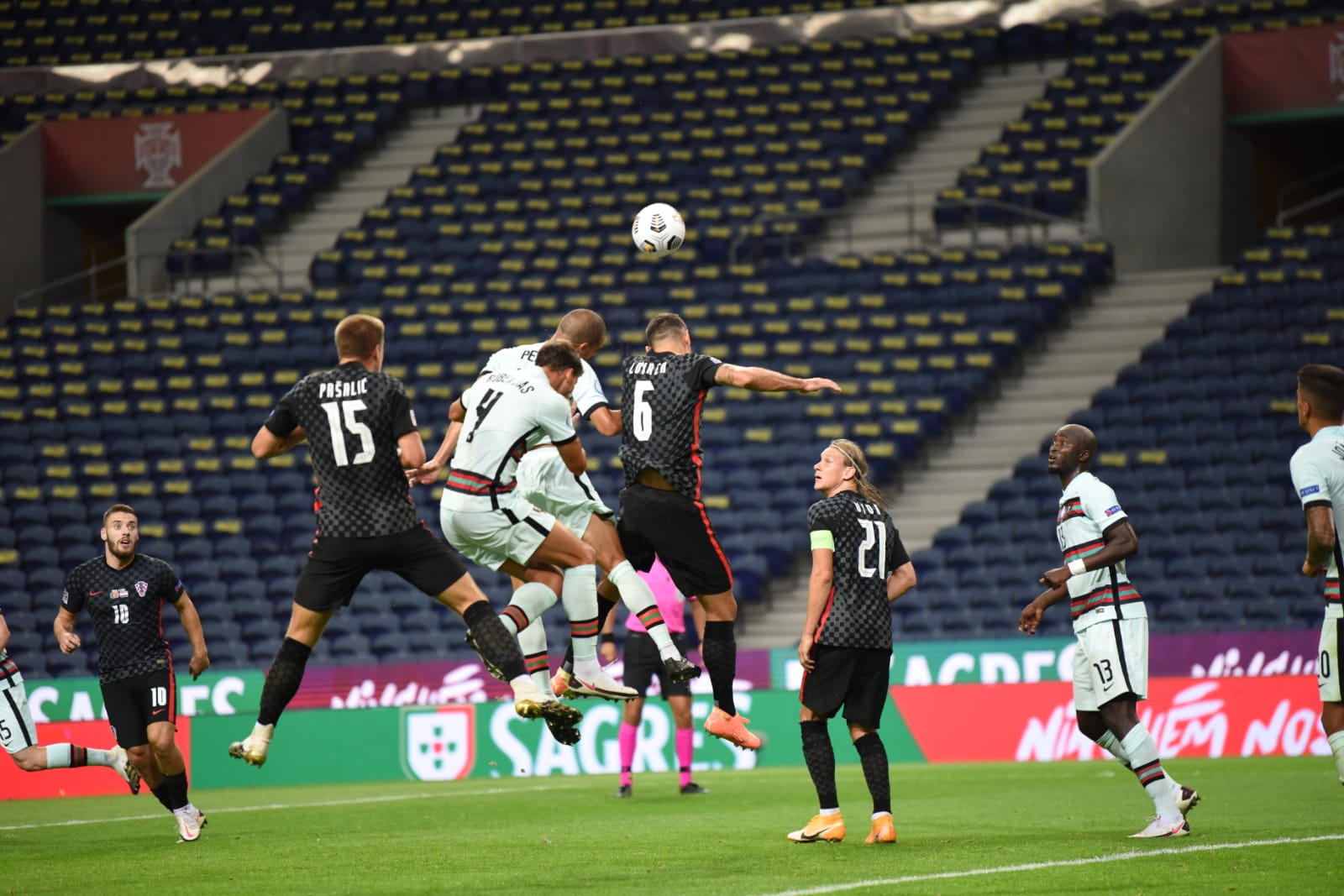
Slobodan Kadic
Things didn't improve much in the second half for the Croatian team. Diogo Jota scored in the 58th minute, and in the 70th Joao Felix made it 3:0. In the 90th minute it seemed that the final result wouldn't be a total disaster, as Bruno Petković scored and made it 3:1, seconds before the official time was up. Andre Silva, however, managed to score yet another goal in the last seconds of the game, making 4:1 the final result.
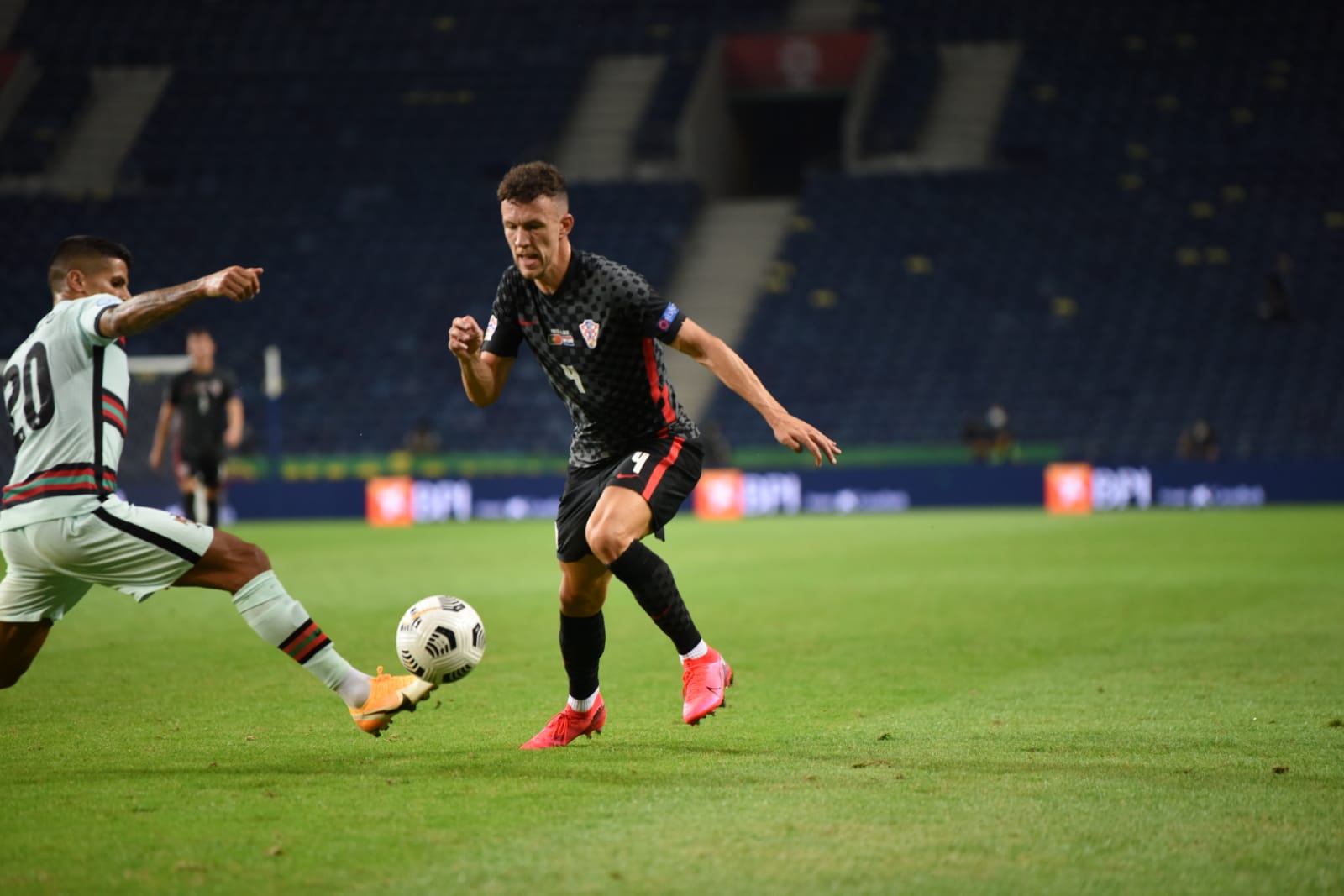
Slobodan Kadic
In three days, Croatia will play the world champions France at the Saint-Denis stadium in Paris. Hopefully, at least somewhat better news for the Croatian national football team and their fans will come from Paris.
For the latest travel info, bookmark our main travel info article, which is updated daily.
Read the Croatian Travel Update in your language - now available in 24 languages!
Croatian Sport 2020: A Look at Year Ahead
January 2, 2019 - After reviewing 2019 in Croatian sport, a look at the year ahead.
A remarkable year in Croatian sport lies ahead. It is the year of the Summer Olympic Games in Tokyo, and the Euros in handball, water polo, and football - but that doesn’t even scratch the surface.
A closer look at 2020 in Croatian sport.
The first weekend of 2020 will kick off with the always exciting ski spectacle on Sljeme in Zagreb - the Audi FIS Ski World Cup “Snow Queen Trophy” 2020. Namely, on Saturday, January 4, the women's slalom will feature in the program, while a day later, the men will take the stage. Croatian skiers will compete in both of these races.
Leona Popovic is the biggest expectation in the women's competition after she won the first slalom points in her career in Lienz, Austria, not even one week ago. However, Croatia has a respectable team of skiers, as evidenced by the fact that three Croatian representatives have finished with points twice this season, which many nations cannot boast.
The first-ever ATP Cup will take place across Australia in Brisbane, Perth and Sydney from January 3 to 12. The Croatia national team will play in Sydney against Argentina and Poland. Borna Coric, Marin Cilic and Viktor Galovic will represent Croatia. Croatia’s tennis players will continue their stay in Australia for the Australian Open in Melbourne from January 14 to 27.
Croatia handball is next to steal the show, as from January 9 to 26, the European Championships are held. For the first time in history, the Euros will be played in three countries (Austria, Norway, Sweden) with 24 national teams. The ‘Cowboys' are placed in Group A in Graz, where their opponents will be Montenegro (January 9), Belarus (January 11) and Serbia (January 13). The two best teams move to the second round to be played in Vienna, and from that newly formed group (which will likely include Spain and Germany), the two top-ranked teams go to the semifinals.
Nearly running parallel to the Handball Euros is the European Water Polo Championship, which will be played in Budapest. This competition begins on January 14 and ends on January 26, with the ‘Barakudas’ in Group A against Germany (January 14), Montenegro (January 16) and Slovakia (January 18). The winner of the group goes directly to the quarterfinals, and the second and third go to the playoffs against Group C, hosted by Hungary, Spain, Turkey and Malta.
The second half of the Croatian First League returns earlier than ever, on January 31, with the match between Inter Zapresic and Istra 1961. The other games of the 20th round will be played in February.
Croatian football will be in focus in the first half of February, because in addition to the Championship, the Croatian Cup will continue, where Rijeka and Dinamo are scheduled in the quarterfinals on February 5. On February 12, the semifinals will be played with the winner of Rijeka - Dinamo against the host Osijek, while the other semifinal features Slaven Belupo and Lokomotiva.
The Champions League knockout phase continues on February 18, followed by the Europa League two days later.
Croatia basketball will begin qualifications for EuroBasket 2021 in February. Coach Veljko Mrsic will again not be able to count on NBA players or those who play in the Euroleague. Croatia welcomes Sweden on February 21 and visits the Netherlands three days later. Turkey is also in Croatia's group, and three national teams will qualify for EuroBasket.
The Croatia football team returns in March for two friendly games as part of their Euro preparations. The dates, as well as the opponents, are still unknown. On January 31, we will find out Croatia’s remaining rival in the Euros alongside England and the Czech Republic. The Nations League C Playoffs will be played that day, and the winner will play in Glasgow against Croatia in the third round of Group D on June 23. It will either be Scotland, Israel, Norway or Serbia.
April may be crucial for the Croatia handball team. Should the Cowboys fail to qualify for the Olympic Games in January at the Euros, their next exam will be held from April 17 to 19 when the Olympic Qualifying Tournament will be played.
In May, the focus returns to football thanks to the Croatian Championship and Cup, with an emphasis on the Cup final on May 13 at Subicevac, followed by the last round of the Croatian First League, which will be played on May 17.
The second Grand Slam tournament of the season, Roland Garros, begins Sunday, May 24.
In June, we move our attention to the Euros in football, which begins with the Turkey-Italy match on June 12. Zlatko Dalic's side will play two friendly games, one in Osijek on June 1 or 2, and one away in France, as a rematch of the World Cup final and general prep for the Euro competition. At the Euros, Croatia will play against England at Wembley on June 14, while the second and third Group D matches will be played in Glasgow: on June 19 against the Czech Republic and June 23 against the Nations League C winner.
At the same time Croatia is expected to get out of their Euro group, the Croatia basketball team will play in the final Olympic Qualifying Tournament at the Spaladium Arena in Split. Brazil, lead by coach Aco Petrovic, Tunisia, Germany, Russia and Mexico will participate in the qualifying tournament. Only the best of these teams will go to Tokyo.
Days later, tennis fans can rejoice with the return of the most prestigious tournament in the world, Wimbledon, on June 29.
On Friday, July 24, the new season of the Croatian First League and the Olympic Games begin in Tokyo. The biggest sports celebration will last until Sunday, August 9. Croatian athletes are looking to repeat the medal harvest from 2016 in Rio de Janeiro, where they took home ten medals, five of which were gold.
In August, Croatian football clubs will fight to qualify for the group stage in one of the UEFA competitions. Namely, in the summer of 2020, five Croatian clubs will compete in the Champions League and Europa League qualifiers.
A new edition of the Nations League will follow in early September. The Croatia national team will once against compete in the highest rank.
Shortly after that, the Champions League and Europa League seasons will kick-off for the last time in the format as we know it. Recall, from 2021, there will be 32 instead of 48 clubs so far. At the same time, the last Grand Slam of the season, the US Open, will begin.
This is merely a fraction of what's on in Croatian sport this year. Follow TCN to find out more.
Source: Gol.hr
To read more about sport in Croatia, follow TCN’s dedicated page.
Croatian Sport 2019: A Year in Review
December 23, 2019 - How did this year compare to Croatia’s most successful year in sport? A look at Croatian sport in 2019.
It seemed as though nothing could quite compare to 2018. It was the year Croatian football became World Cup finalists. The year Croatia brought home the Davis Cup trophy and thus gained sweet revenge on France. A year so successful, we’d never seen anything like it in Croatian history.
As 2019 began, I was hardly optimistic.
“How could we be so lucky again?”
Fortunately, the year was full of pleasant surprises. It was a year that saw our young talents thrive. A year that saw countless triumphs in both individual and team sports. It was another epic year in Croatian sport.
Here is our 2019 year in review.
Croatia Handball: 2019 began with the Men’s Handball World Championship, which featured Croatia in Group B. After four impressive wins against Iceland, Japan, Macedonia, and Bahrain, Croatia met Spain to decide the winner of the group. After topping Spain 23:19, Croatia went on to win Group B and continued to the main round of the tournament. Croatia was not so lucky there, losing to Brazil 29:26 and Germany 21:22, which ultimately took them out of the fight for the medal. A win against France for the final game of the main round restored their morale, though a loss to Sweden, in the end, saw Croatia finish the tournament as the 6th best team in the world. Croatia will play in the European Championships next month against Montenegro, Belarus and Serbia in Graz.
Franko Grgic: Promising Croatian swimmer, 16-year-old Franko Grgic, won two gold swimming medals in the 800-meter and 1500-meter races at this year's World Junior Championships, and was even selected among the five finalists for the Piotr Nurowski Award, which as awarded by the European Olympic Committees (EOC) for the ninth time. Though he didn’t win the award in the end, he made sure he was on everyone’s swimming radar. The PK Jadran Split swimmer had an outstanding August, celebrating two gold medals and achieving new records at the 7th FINA World Junior Swimming Championships in Budapest. After winning the gold in the 800-meter-freestyle while breaking a Croatian record, the 16-year-old swimming sensation became the world champion in the 1500-meter-freestyle and achieved a new world junior record with a time of 14:46.09 minutes. Grgic swam 10.46 seconds faster in Budapest than his best-ever record in the 1500 meters, which was also Croatia's national record. Franko’s previous career-fastest in the 800-meter free was achieved in Zagreb in March, where he swam 7:53.75. In Budapest, however, Grgic was 8 seconds faster, thus breaking the Croatian record held by Marin Mogic (7:51:78). Grgic was thus named the 25th fastest performer of all-time, any age, in this 800-meter freestyle. At the beginning of the year, Grgic won the gold in the 400-meter and 1500 meter at the EYOF in Baku, and also hit the Olympic standard for Tokyo 2020. We can’t wait to see him in Tokyo next summer.
Croatia Basketball: It wasn’t the greatest year for Croatia basketball, which failed to qualify for the World Cup in China back in August. However, with new coach Veljko Mrsic on the bench, Croatia still has a chance to qualify for the Tokyo Olympics. The light at the end of the tunnel to 2019 was the welcoming news that Split would be host to the 2020 Olympic Qualifying tournament next June, where Croatia will face Tunisia and Brazil, and crossover with Germany or Russia. It will be the strongest tournament played on Croatian ground since EuroBasket 1989 in Zagreb. But not all was bleak. In the NBA, Croatia captain Bojan Bogdanovic saw a stellar transfer to the Utah Jazz this summer, where he’s been playing the basketball of his career. Ivica Zubac is still a hit at the LA Clippers and Dario Saric is finding his footing better at the Phoenix Suns. Croatia also boasts a record seven players in the NBA this season. To end on a high, two legendary Croatian basketball players Toni Kukoc and Giuseppe ‘Pino’ Giergia have been listed among the 50 candidates nominated for the Basketball Hall of Fame in Springfield, Illinois.
Dina Levacic: Another year, another swimming success for Dina Levacic! In 7 hours, 13 minutes and 15 seconds, 23-year-old Solin native Dina Levacic completed the Tsugaru Strait to complete the fourth open water channel swim out of the seven in the 'Oceans Seven' challenge. The channel is located between Japan's largest island, Honshu and Hokkaido, and high waves and strong frontal wind accompanied the Croatian swimmer the entire way. The member of the Split Swimming Club set one of her best times and became only the 67th person to complete the Tsugaru Strait.
The ‘Ocean Seven’ is a series of seven international swimming marathons, modeled after the Seven Summits mountaineering challenge. Dina Levačić had already swum three marathon channels from the ‘Ocean Seven’ series before attempting the Tsugaru: Catalina Channel, English Channel (La Manche) and Moloka’i Channel. After the Tsugaru Strait in Japan, Dina will still need to overcome the North Channel between Northern Ireland and Scotland, the Strait of Gibraltar between Europe and Africa and the Cook Strait in New Zealand.
Croatia Football: On the heels of the greatest sporting success in Croatian history, the Croatia football team did not disappoint this year. Croatia’s Euro 2020 qualifiers kicked off back in March against Azerbaijan, where they won 2:1 at home. A shocking loss to Hungary stirred the pot, though wins against Wales and Slovakia put Croatia back on their feet. Draws to Wales and Azerbaijan complicated Croatia’s road to the Euros only slightly, as big wins against Hungary and Slovakia in the return games sealed the deal. Croatia not only qualified for the Euros next summer, but they finished at the top of their qualifying group. 2019 was also a pivotal year for Croatian football, as it will be remembered as the year the national team returned to Poljud stadium in Split for the first time since 2015. Croatia played to a sold-out stadium and coach Zlatko Dalic called it the best atmosphere they’d experienced. The Euros await Croatia next year, where they will face England, the Czech Republic, and the winner of the Nations League C (Norway/Serbia v Scotland/Israel).
Dinamo Zagreb: It was another successful year for Dinamo Zagreb, who clinched the Croatian Championship title for the 20th time back in April after defeating Slaven Belupo. Dinamo secured the title six rounds before the end of the season and 23 points ahead of Rijeka in second. While Rijeka went on to win the Croatian Cup, Dinamo went on to have an impressive Champions League campaign. After soaring through the Champions League qualifiers and playoff round, Dinamo advanced to the Group Stage against Manchester City, Atalanta, and Shakhtar Donetsk. Dinamo opened their seventh Champions League appearance against Atalanta at Maksimir stadium with a shocking 4:0 victory. They fell to City both times, drew to Shakhtar twice, and couldn’t do itagainst Atalanta the second time around. The Zagreb club finished last in their group and will not continue their European run in the spring.
Croatia Water Polo: It was a busy year for the Croatia water polo team, which began with the Europa Cup in Zagreb, where Croatia failed to defend the title after losing to Hungary in the final. From the Europa Cup to the World League Super Final in Serbia, Croatia went on to defeat Kazakhstan, Australia, Japan, and Spain for a spot in the final against Serbia, where they lost by one goal. The summer continued with the World Championships, where Croatia was again better than Australia, the USA, and Kazakhstan. They defeated Germany in the quarterfinal but lost to Spain in the semis to miss their chance in the final. Croatia did, however, beat Hungary for third place. Croatia will compete in the Euros next month, where they will have to finish at the top to secure their spot in the Tokyo Olympics next summer. Croatia water polo ended the year with yet another impressive recognition as two team members are among the top seven in the world - Maro Jokovic and Josip Vrlic.
Croatia Tennis: Unlike last year, where Croatia took home the Davis Cup title, this year saw a Croatia squad plagued with injuries and a new coach just days before the tournament was to begin. Croatia didn’t make it out of their group this time around after falling to Russia and Spain, but they can be proud of their individual achievements. Osijek native Donna Vekic made it to the Nottingham final where she lost to Caroline Garcia. She even advanced to the round of 16 at the Cincinnati Masters, Roland Garros, and the US Open. Petra Martic defeated 19-year-old Czech player Markéta Vondroušová to get her first WTA title at the Istanbul Cup. Martic also secured the fourth WTA final of her career at the Zhengzhou Open, where she lost to Karolina Pliskova, and also faced Serena Williams in the US Open round of 16. Both Petra and Donna played in the WTA Elite Trophy tournament, which brings together female tennis players ranked 9th to 19th on the WTA ladder. Borna Coric made it to the semifinal of the Dubai Open, Rosmalen, and St. Petersburg, where he ultimately went on to the final. Marin Cilic’s first semifinal in fourteen months wasn’t until the Kremlin Cup back in October. The real star of Croatian tennis this year is Ivan Dodig, who won two ATP doubles titles with Filip Polasek, at the China Open and the Cincinnati Masters. Dodig also won the Wimbledon mixed doubles title with Latisha Chan and defended their Roland Garros title just weeks before.
Sandra Perkovic: Sandra Perkovic failed to defend the world championship title in the discus throw this year, which she won two years ago in London, but still secured a medal at the World Championships in Doha. Namely, Perkovic won the bronze medal after throwing 66.72 meters in the first series of the finals, while Cubans Yaime Perez and Denia Caballero were the gold and silver medalists. This was Sandra’s fourth medal at the World Championships. Sandra became the world champion in Moscow in 2013 and London in 2017 and won the silver in Beijing in 2015. In addition to four world championship medals, Perkovic is a two-time Olympic gold medalist and five-time European champion.
Croatia Gymnastics: It was another big year for Tin Srbic, who won the silver medal at the European Championships in Szczecin in the horizontal bar event. The Croatian gymnast went on to win the gold medal with an impressively high score of 14.900 points at the World Cup in Paris, and ended the year with a silver medal at the World Championships in Stuttgart. He was also named the best Croatian male athlete by the Croatian Olympic Committee.
Croatia’s best female gymnast Ana Đerek won the gold medal at the World Cup competition in Osijek after a brilliant floor performance, and Robert Seligman advanced to the Cottbus World Cup finals in the pommel horse.
Sinkovic Brothers: The dynamic duo did it again! The year began with a second-place medal in the coxless pairs at the World Cup in Plovdiv, though it only went up from there. Martin and Valent Sinkovic defended their world rowing championship title in the coxless pairs in Linz-Ottensheim, Austria, qualified for the Tokyo Olympics, and ended the year as the best rowing team in the world, declared by the FISA World Rowing Organization!
Snjezana Pejcic: Croatia's best female shooter Snjezana Pejcic and her Indian teammate Divyansh Singh Panwar won the mixed team air rifle competition to wrap up the World Cup final in Putian, China. Pejcic has already qualified for the 2020 Tokyo Olympics, which will be her fourth appearance at the Olympic Games.
Croatia Taekwondo: The Croatia national team finished their appearance at the European Senior Championships with three medals - silver medals for Lovro Brecic and Toni Kanaet and a bronze for Matea Jelic.
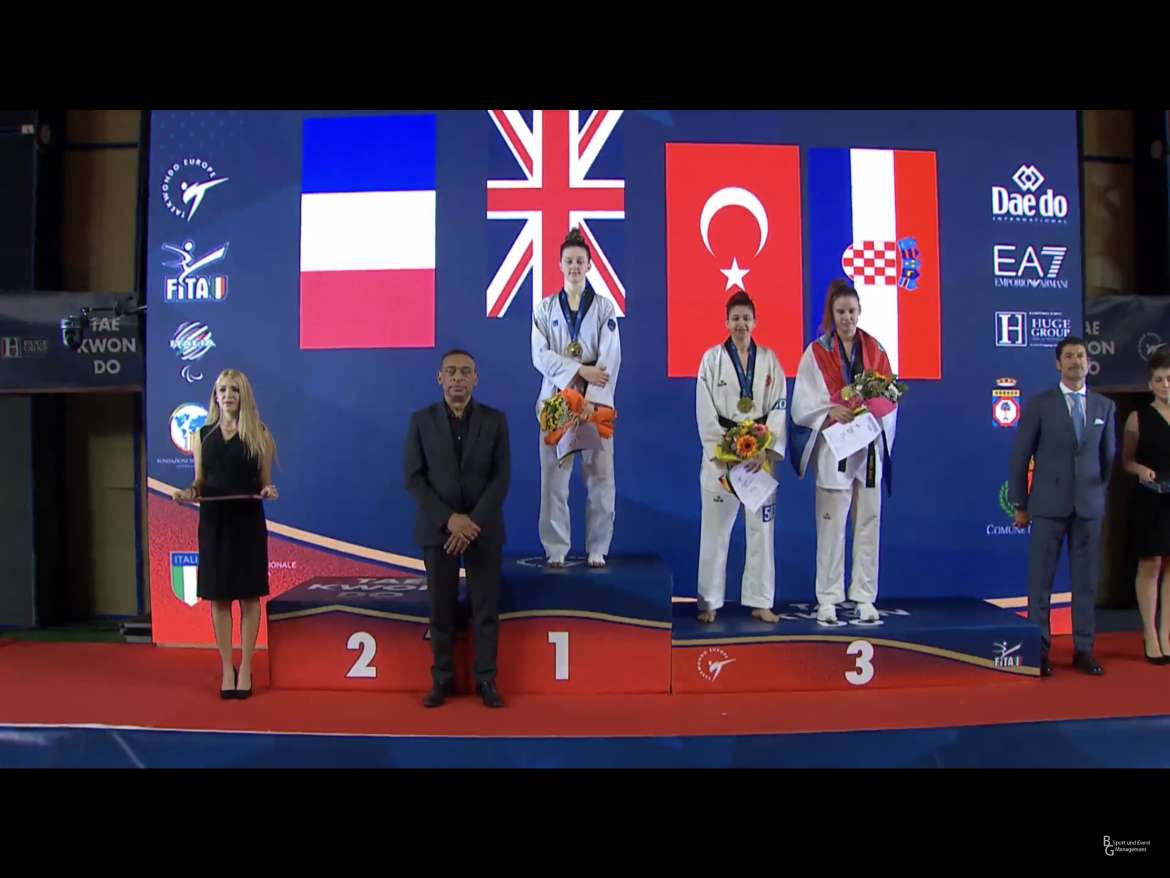
Dino Sinovcic: Croatian Paralympian Dino Sinovcic won the 100m backstroke gold medal in the S6 category at the WPS World Paralympic Championships in London. Sinovic won at the Queen Elizabeth Aquatic Center with a time of 1:15.46, ahead of the Chinese swimmer Hong Yang who swam a time of 1:15.47 for the silver, and Argentine Matias De Andrade, who swam a time of 1:16.91 for the bronze.
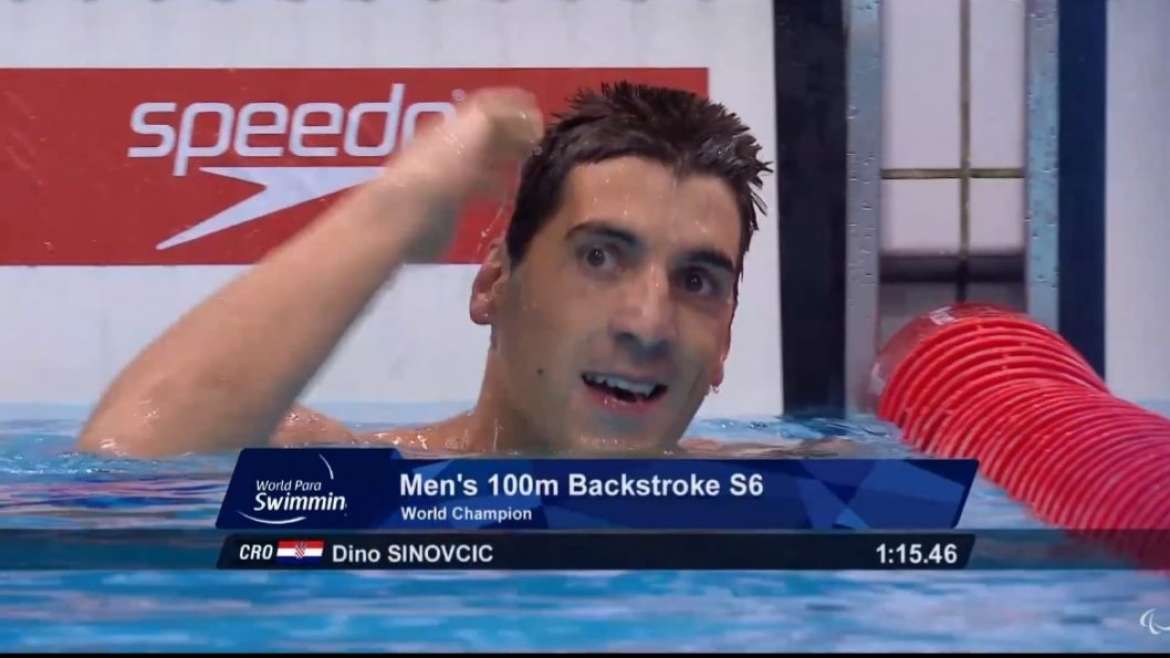
Stipe Miocic: The 36-year-old Croatian-American Stipe Miocic defeated 40-year-old American Daniel Cormier by a knockout in the fourth round of the UFC 241 fight held in Anaheim, California. Stipe thus won sweet revenge on Cormier and brought back the UFC Heavyweight Champion title to Ohio after he lost it to Cormier in Las Vegas 13 months before. The fight between Miocic and Cormier lasted more than 19 minutes, in which the title defender had more significant blows (123-98).
Croatia Karate: The karate gold and silver came to Croatia thanks to the brilliant Kvesic brothers from Karate club Hercegovina-Zagreb. At this year's European Games in Minsk, Ivan Kvesic won the gold medal while his brother Anđelo Kvesic secured the silver. Croatian representatives returned home with eight medals from the European Games in Minsk - two gold, one silver and five bronze.
To read more about Croatian sport, follow TCN's dedicated page.
New Indictment Upheld against Zdravko Mamić for Embezzlement of Funds from Dinamo
ZAGREB, May 21, 2019 - Osijek County Court on Tuesday upheld a new indictment which the Office for Suppression of Corruption and Organised Crime (USKOK) filed against Zdravko Mamić and six more people on suspicion of having defrauded Dinamo of 200 million kuna from 2004 to December 2015 when he had held a few executive posts in that Zagreb-based football club.
The latest indictment refers to Zdravko Mamić's brother and son – Zoran and Mario Mamić – as well as to a former Dinamo director, Damir Vrbanović, football manager Nikky Artur Vuksan and entrepreneurs Sandro Stipančić and Igor Krota.
Under that indictment, Zdravko Mamić and the other suspects are charged with having conspired, in the period from December 2004 to December 2015, to defraud Dinamo of more than 144 million kuna through fictitious contracts between Dinamo and several foreign companies and bills for the payment of non-existing services related to player transfers. Under those contracts, Dinamo was also obliged to pay an additional amount of 7.35 million euro or 55.8 million kuna.
The USKOK deputy chief, Sven Mišković, said today that, in compliance with their bilateral agreement on extraditions, Croatia would ask Bosnia and Herzegovina to hand over Mamić, who is on the run in that country after he was already sentenced to six and a half years in jail for embezzlement of funds from the club in another case.
As soon as the Supreme Court confirms the investigative custody, the procedure for lodging a request for Mamić's handover can start.
The preparatory hearing is to be scheduled within next two months.
More news about Zdravko Mamić can be found in the Sports section.
Croatia’s 1998 World Cup Bronze Medal Offered at Auction
An auction house using the The Saleroom platform has made an offer for the sale of one of the bronze medals which the Croatia national football team won at the 1998 World Cup in France, reports Večernji List on November 20, 2018.
“World Cup 1998 France. Winner medal Croatia - Official winner medal of the Croatia team for coming third at the World Cup in France 1998. Coupe du monde de la FIFA France 1998. Bronze on original tricolor silk ribbon. Manufacturer Bertoni. 5 cm. There were only 30 copies of this medal. Absolutely rare, extra fine,” says the description of the medal.
There are only 30 such medals, and it is not known who of the bronze generation national team members has decided to offer his medal for sale.
The auction house guarantees the authenticity of the offered medals.
The starting price for the medal is 7,500 euro, and the auction will be held on December 7 and 8.
Miroslav Ćiro Blažević, who was the manager of the national team in 1998, commented on the sale. “I do not believe that one of my players would sell it because they are all well-off. Maybe it has been stolen, but you never know. I have not heard about this news before, but it is certain that the seller will not remain anonymous, such things always leak in the end,” said Blažević, adding that he recently had a burglary in his apartment, but that the thieves did not steal his medal. “To be honest, everything has its price so I would sell it for good money,” he added.
Athletes sometimes donate their medals for various charity events, but they are very rarely offer for sale at auctions.
“I have donated a lot of my stuff for charity drives so far, but I would never give my medal,” said Blažević.
Players at the 1998 World Cup team were: Dražen Ladić, Petar Krpan, Anthony Šerić, Igor Štimac, Goran Jurić, Slaven Bilić, Aljoša Asanović, Robert Prosinečki, Davor Šuker, Zvonimir Boban, Silvio Marić, Marijan Mrmić, Mario Stanić, Zvonimir Soldo, Igor Tudor, Ardian Kozniku, Robert Jarni, Zoran Mamić, Goran Vlaović, Dario Šimić, Krunoslav Jurčić, Vladimir Vasilj
Miroslav Blažević was the manager, and he was assisted by Branko Ivanković, Ivan Katalinić, Marijan Vlak, Luka Radman, Mladen Čepulić, Boris Nemec, Tomislav Vrbnjak, Bojan Radanović, Željko Mesić, Mladen Pilčić, Zorislav Srebrić, and Darko Tironi.
For more on Croatia’s national football federation, click here.
Croatian Artist Designs FIFA’s Player of the Year Award
The artist attended the recent ceremony where Croatia’s Luka Modrić was named FIFA’s player of the year.


